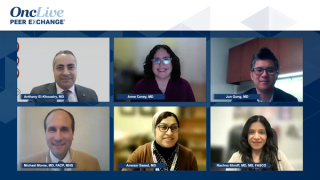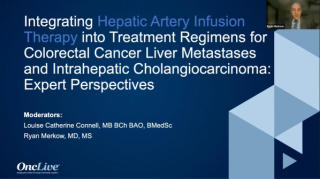
Gastrointestinal Cancer
Latest News

NICE Recommends Pembrolizumab Plus Chemo for Untreated HER2– Advanced Gastric/GEJ Adenocarcinoma
Latest Videos

CME Content
More News
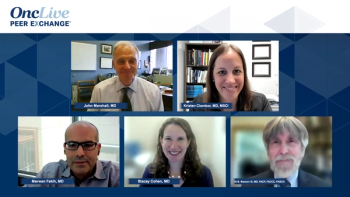
Oncology experts evaluate the influence of fruquintinib on current treatment protocols, drawing insights from the FRESCO and FRESCO-2 clinical studies.

Shubham Pant, MD, MBBS, discusses findings from the phase 2b HERIZON-BTC-01 study of zanidatamab in pretreated HER2-positive biliary tract cancer.

Tanios S. Bekaii-Saab, MD, FACP, details data from the ESOPEC trial in early-stage gastroesophageal cancers, and findings from Checkmate-9DW in HCC.

Leading colorectal cancer specialists analyze the SUNLIGHT trial results, focusing on age-related efficacy data and its implications for treatment strategies.

Key opinion leaders explore treatment selection for third-line metastatic colorectal cancer patients, examining factors influencing therapy choice with particular focus on comparing fruquintinib to TAS-102 (with or without bevacizumab).

Ciara Kelly, MBBCh, BAO, discusses the current and potential roles for ripretinib in the gastrointestinal stromal tumor treatment paradigm.

Mark Agulnik, MD, discusses the evolving management of heterogeneous disease types in gastrointestinal stromal tumors.

RMC-6236 led to early antitumor activity with an acceptable safety profile in patients with previously treated pancreatic ductal adenocarcinoma.

Ciara Kelly, MBBCh, BAO, discusses ongoing GIST research for GIST Awareness Day.
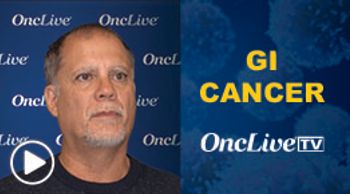
Jonathan C. Trent, MD, PhD discusses the current standard of care and existing unmet needs for patients with GIST.

The colorectal cancer experts offer insights on a patient case and investigate the obstacles faced by patients with metastatic colorectal cancer requiring third-line or later therapy.

The panel examines prevalent adverse events experienced by patients receiving second-line biomarker-directed therapy for metastatic colorectal cancer.

Curium has submitted an NDA to the FDA for its formulation of lutetium Lu 177 dotatate for SSTR-positive gastroenteropancreatic neuroendocrine tumors.

Data from the phase 2 REGINA trial support further investigation of neoadjuvant regorafenib, nivolumab, and SCRT in locally advanced rectal cancer.

Chih-Yi Liao, MD, discusses treatment considerations for patients with hepatocellular carcinoma and emphasizes the need for a multidisciplinary approach.

Anjana Pillai, MD, detailed how the treatment landscape for HCC is evolving, highlighting data from EMERALD-1.
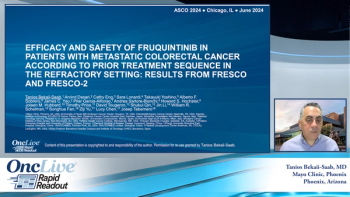
A phase 3, randomized, double-blind, placebo-controlled study to determine if prior TAS-102 and/or regorafenib treatment status and sequence affect the efficacy and safety of fruquintinib in patients with mCRC. This study used data from both FRESCO (NCT02314819) and FRESCO-2 (NCT04322539).

Chih-Yi Liao, MD, discusses the treatment landscape of advanced biliary tract cancer and outlines therapy selection factors.

The panel examines data from the ZL-IRIAN study and Phase II study, which provide insights into second-line treatment options for patients with metastatic colorectal cancer.

Anjana Pillai, MD, details a patient case study and key takeaways from a presentation she gave at an OncLive® State of the Science Summit™ on locoregional therapies for HCC.

Patients with resectable gastric cancers achieved superior OS and pCR rates with perioperative pembrolizumab plus chemotherapy vs chemotherapy alone.

Salman R. Punekar, MD discusses the rationale for evaluating safety and preliminary anti-tumor activity of NT-112 in solid tumors with the KRAS G12D mutation.

Tislelizumab plus chemotherapy improved OS in patients with unresectable esophageal squamous cell carcinoma and a CPS or TAP score of at least 1 vs 1%.

IBI343 was well tolerated and demonstrated signs of efficacy in patients with CLDN18.2-positive advanced gastric/GEJ adenocarcinoma.

Durvalumab plus chemotherapy sustained an overall survival benefit vs chemotherapy alone in locally advanced or metastatic biliary tract cancer.







